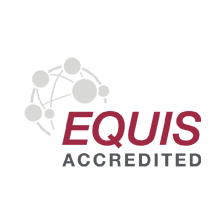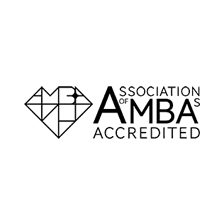The Executive MBA by UPF-BSM is the management development program with an international focus that will boost your professional career and help you develop a strategic vision, a global mindset, and the ability to lead through disruption with confidence. The Executive MBA by UPF-BSM is designed for professionals who refuse to stand still.
Transform your career with an Executive MBA that’s as bold and agile as you are. This isn’t just another degree—it’s an Official Master Degree, proudly accredited by AMBA and backed by the outstanding reputation of Pompeu Fabra University.
Imagine an 18-month, part-time journey designed for top-tier executives and managers who know that leadership isn’t a one-size-fits-all. Our flexible online program lets you keep excelling at work while you master the management skills to steer global organizations through today’s unpredictable markets.
In Executive MBA program, you won’t just learn theory. You’ll develop the savvy, strategic vision needed to transform organizations, tackle uncertainty head-on, and craft innovative solutions to the challenges modern businesses face. Ready to level up and lead the charge in a rapidly evolving world? Your future as a global leader starts now.
We’re living in a time of radical change. AI, digital disruption, and automation aren’t just buzzwords—they’re rewriting the rules of business. With our Executive MBA, you won’t just keep up; you’ll lead the charge.
Imagine this 18-month, part-time journey in our business school as your secret weapon to:
- Sharpen Your Strategy: Equip yourself with the tools and mindset to steer organizations through unpredictable markets and define their business strategy.
- Make Bold Decisions: Master the art of decisive leadership under pressure with innovative, cutting-edge ideas.
- Stay Globally Relevant: Decode market shifts and sustainability imperatives in a world where AI drives decision-making.
- Elevate Teamwork & Leadership: Transform your approach to collaboration and leadership to deliver real results.
- Learn, Collaborate, and Build Lifelong Bonds: Success in business is built on relationships. Through immersive teamwork experiences, our program fosters deep collaboration, strengthening your ability to work with and learn from diverse, high-calibre professionals. You won’t just gain knowledge—you’ll build trusted connections that last a lifetime.
Backed by Pompeu Fabra University—the top Spanish university and ranked 15th worldwide among those under 50—and UPF Barcelona School of Management’s EQUIS accreditation, this Executive MBA is more than a degree. It’s your launchpad into a future where you lead with confidence and clarity.
Transform your career trajectory in business administration with the UPF-BSM Online Executive MBA—your gateway to game-changing insights, an elite network, and executive-level expertise that will propel your next move to new heights.
Ready to make your voice heard?
Why choose this program
Train at an Accredited School
This Executive MBA belongs to a business school recognized by EQUIS and AMBA and accredited by AQU, placing UPF-BSM among the best business schools in the world.
Learn Flexibly and Customized
Online Executive MBA: Learn anywhere, lead everywhere – The program assures flexibility without compromise. An online format that allows you to balance career, life, and growth—without sacrificing the immersive experience and high-impact learning.
Lead with Integrity in a Complex World
Modern leadership demands more than just business acumen—it requires a strong moral compass. Our Executive MBA challenges you to navigate the ethical and moral dilemmas faced by C-suite executives and board members, equipping you with the decision-making framework to lead with integrity beyond sustainability.
Lead with absolute confidence
Make decisions that shape industries, backed by real-world strategy and cutting-edge insights. All while balancing your professional and academic growth through a flexible, innovative learning experience.
Career Acceleration with Impact
Take control of your trajectory in business administration with top-tier career coaching, leadership mentoring, and direct access to global business leaders. Whether you’re leading a Fortune 500 company, scaling a startup, or transforming your industry, this EMBA prepares you to leave a mark that matters.
Join a Powerful Global Network
Your MBA journey doesn’t end at graduation—it’s just the beginning. Become part of an elite community of over 30,000 alumni, opening doors to global career opportunities, mentorship, and lifelong professional support.
Who is it for?
The program is designed for professionals and executives with at least 5 years of work experience. The Executive MBA at UPF Barcelona School of Management is for leaders, innovators, and game-changers. The recommended entry profile for the Master is university graduates interested in the field of business administration and management. This Master is designed for graduates from various disciplines in the social sciences (such as Sociology, Law, Economics and Business), as well as Science and Engineering in their various specialties, with a minimum of 5 years’ professional experience.
Accreditations
The UPF Barcelona School of Management is the management school of the Universitat Pompeu Fabra (UPF), the 3rd best public university in Spain according to the Times Higher Education ranking. It is the best Spanish university, 10th in Europe, and in the Top 20 worldwide in its 2023 ranking of the best young universities.
UPF Barcelona School of Management has EQUIS accreditation, the most prestigious institutional recognition for business schools globally, and places itself among the top business schools in the world.
The Executive MBA has AMBA accreditation from the Association of MBAs, which recognizes UPF-BSM for its academic quality and reputation.
The Executive MBA is an official master's degree and has the academic recognition of the Ministry of Education of the Government of Spain. The Quality Agency of the University System of Catalonia (AQU) has also institutionally accredited UPF-BSM. This accreditation certifies all the official master's degrees that we teach and recognizes the quality of our educational model in accordance with the criteria of the European Higher Education Area (EHEA).
QS Business Masters ranking 2024 For the second consecutive year, the "Executive MBA 2024" ranking published by QS, one of the most consulted rankings in the higher education sector worldwide, includes UPF-BSM among the best selected business schools.
Curriculum
The Executive MBA is structured over 18 months in which students will participate in core and optional subjects.
We have identified a set of key competencies that favour the professional development of the participants: leadership, communication, co-operation, adaptive thinking, decision-making, and autonomous learning. You will work on these competencies in an integrated and transversal way throughout the Executive MBA.
The MBA is taught in Spanish, but subjects in English can be chosen from among the electives.
Schedule: Friday 4:00-7:30 PM (to be confirmed)
The program also consists of an individual project that is defined in the intensive initial week (from 9 am to 7 pm) and is developed throughout the Executive MBA.
Welcome Residential Week
- Institutional Welcome: Who is Who at UPF Barcelona School of Management
- EMBA Program Presentation & Pre courses. BSM Inside
- Icebreaker and Networking Activities
- Careers Kick Off: Leadership and Self Awareness
- Master Class: Business Trends and the Executive MBA 2026
- Visit: Barcelona Super Computing Center
Term A. Explore (15 ECTS Core)
Term B. Develop (15 ECTS Core)
Term C. Integrate (12 ECTS Core)
Term D. Lead (12 ECTS elective)
Program Finale Residential Week
- Welcome to the Program Finale: Institutional words
- Welcome to the UPF-BSM Alumni network
- Final Master Thesis Defense
- Your Career Transformation: Professional support for graduates
- Graduation Ceremony
Note on the Curriculum
Complementary activities
The Executive MBA also includes the possibility of participating in practical, and personal and professional growth activities such as:
- The Outdoor Training is a weekend of disconnection in a mountain hotel, in which team building activities are carried out with the aim of identifying roles and leaders, and improving managerial and team management skills.
- The International Study Trips which are work trips in which you will visit the stock market and companies with the aim of learning about new international markets. We have previously visited Shanghai (China) or London (United Kingdom), among others.
- The MBA Challenge is a four-day competition in which you will have the opportunity to work on a real challenge from a large corporation. Companies such as La Fageda, the Oncological Foundation of Catalonia, the Sant Joan de Déu Hospital, or the Josep Carreres Foundation have already entrusted their cases to UPF-BSM participants.
- International mobility: The UPF Barcelona School of Management offers you the possibility of expanding your training and international vision through the International Mobility Programme. Extend your studies extracurricularly, during the academic year following the completion of your Master's, at a top-level institution. Limited places.
- UPF-BSM Inside: is a group of interdisciplinary subjects (applied data, communication, creativity, innovation and project management, sustainability and leadership among others) that, if you take this program, you can access at no additional cost. They are 100% online and you can take them throughout the academic year at your own pace, as they have been designed as self-study subjects.
Qualification obtained
Once students have completed the course they will obtain the Máster Universitario en Ejecutivo en Dirección de Empresas / Executive Master in Business Administration EMBA official Master's Degree, issued by the Pompeu Fabra University.
Issuance of official Master's Degrees: The amount stipulated in the DOGC (Official Gazette of the Government of Catalonia) must be paid for the rights to issue the degree. This rate varies annually and the rate in force at the time of application for the degree will be applied.
Methodology
At UPF-BSM business school, we've honed our online methodology for over 20 years to deliver a curriculum that's as flexible as it is dynamic—designed to help you achieve your professional goals from anywhere in the world.
With 24/7 access to a state-of-the-art virtual environment, you can explore interactive materials, collaborate through advanced digital tools, and participate in live webinars, discussion forums, and weekly tutorials with faculty and peers. This seamless blend of asynchronous and synchronous learning ensures you're always connected, constantly challenged, and consistently growing—all without disrupting your professional career.
Active Learning Methodologies: The Ultimate Advantage
Our approach isn’t just about convenience—it’s about creating real-world impact and expanding your network through innovative, engaging strategies:
- Flipped Classroom: Absorb high-quality theoretical content at your own pace through videos, interactive readings, and digital modules. Then, dive into virtual sessions filled with debates, case analyses, and group problem-solving to transform theory into practical expertise.
- Project-Based Learning (PBL): Tackle real or simulated business challenges by developing projects that demand deep research, collaborative teamwork, and innovative solutions—turning academic insights into actionable strategies that drive success.
- Collaborative Learning: Engage in group tasks and case studies using cutting-edge collaborative tools, where experienced instructors facilitate discussions, ensuring every voice is heard. This method not only strengthens teamwork skills but also fosters a vibrant environment for shared knowledge.
- Gamification: Stay motivated and engaged with a learning experience enriched by game mechanics—simulations, competitions, points, levels, and rewards. This playful yet competitive approach helps you apply knowledge in creative and impactful ways.
In essence, our online methodology applied to the Executive MBA offers you unparalleled flexibility, fosters robust networking, and drives real-world outcomes. It’s not just learning—it’s a transformative journey designed to empower you as a leader in today’s fast-paced global business arena.
For leaders with strategic vision
The Executive MBA is designed for executives, entrepreneurs, and rising leaders who refuse to settle and are ready to take control of their future, embracing the flexibility of our online EMBA program to balance ambition with busy lives.
Real-World Strategy, Not Just Theory
Every module of the Online Executive MBA, every case study, and every challenge is focused on immediate, real-world application—because leadership happens in action, preparing your adaptation to complex business challenges and accelerate your career trajectory.
AI, Innovation & Global Impact
The future of leadership demands digital fluency, strategic agility, and sustainability-driven decision-making—and we put you at the centre of it all, empowering you to shape the future of business.
Integrated Learning through the Master's Thesis
Related to the business environment, the Master Thesis provides participants with the opportunity to connect theory and practice, integrating multidisciplinary competencies and transferring acquired knowledge and skills to professional practice. This culminates in the development and defence of a professionalizing project. The Thesis is developed individually by participants with the support of their mentor and Program Management.
Connection between Theory and Practice
Combined with practical activities, sessions allow students to acquire advanced competencies and skills directly applicable to their professional field, achieving an effective link between academic theory and the realities of the business world. This connection is further strengthened by company visits and masterclasses with executives.
Evaluation
The Executive MBA program includes various evaluation systems for each course: examinations, group projects, and individual assignments. Class attendance is a mandatory requirement to ensure a comprehensive experience and maximize the benefits of the program.
Tools
The learning process is characterized by its flexibility, since, in the virtual learning environment, the structure of the school calendar and the diversity of multimedia resources which are made available to the student allows them to acquire knowledge in a self-regulated manner.
The support of the teaching staff and interaction with classmates is carried out by making use of a wide variety of communication channels that facilitate proximity and didactic dialogue.
Professional Future
The Executive MBA at UPF Barcelona School of Management is our flagship program—where tradition meets breakthrough innovation.
Our mission is simple yet bold: to educate the future leaders poised to make a real difference. This program fuses a global peer network with flexible delivery methods, seamlessly blending cutting-edge digital platforms with time-honoured, state-of-the-art classrooms.
A Program Built for Impact:
- Inclusive & Resilient: Designed to empower you with a quality education that's as forward-thinking as it is robust—perfectly aligned for tomorrow’s challenges.
- Your Defining Moment: This is the launchpad of your leadership journey. Here, courage meets competence; where being a leader means having the vision, confidence, and acumen to inspire and drive change.
Career Services: Connecting Talent and Business
Our elite Career Services harness the power of top accreditations (EQUIS, AMBA) and high QS Rankings to connect you with an unrivalled professional network. We offer:
- Personalized Advisory Service: Tailored career guidance that aligns your strengths and aspirations with the precise needs of leading companies.
- Job Board: A dynamic platform that links you with multidisciplinary opportunities—from internships to executive roles.
- Talent UP: Essential tools and strategies to boost your personal brand, master the art of the interview, and expand your professional network.
- Talent Boost Week: A dedicated employability week where industry giants like Danone, KPMG, and Grifols engage with you to create game-changing connections and career opportunities.
This Executive MBA is more than a program—it’s a catalyst for transformation, a bold step into leadership, and the definitive moment that sets your career on a trajectory for lasting impact.

Student profile
The Executive MBA ecosystem brings together a vibrant network of national and international professionals—from seasoned executives and strategic consultants to investment managers and trailblazing entrepreneurs.
These professionals, experts in fields such as marketing, finance, and human resources, share a bold vision: to make a transformative leap in their careers and lead organizations to new heights in a globalized, sustainable business landscape.
This rich tapestry of diverse profiles fuels a dynamic, multicultural learning environment. It not only elevates the educational experience but also enhances collaborative learning, sparking innovation, strategic thinking, and actionable insights that empower you to excel in today’s competitive world.
Average age
Average experience
International students
Holding management positions
Career opportunities
The Executive MBA: A Crucial Tool for Career Transformation
The Executive MBA shapes leaders prepared to drive change and thrive in uncertainty. By blending theory with hands-on practical sessions, applied projects, and impactful activities, the program empowers participants to take charge of new challenges with innovative solutions.
This results-driven approach strengthens participants’ professional standing and equips them to navigate and lead in VUCA (volatile, uncertain, complex, ambiguous) environments. Upon completion, they are fully prepared to take on the dynamic challenges of the business landscape and lead transformations with confidence.
Transform Your Future:
The Online Executive MBA is more than a program—it's your catalyst for professional transformation. This program equips you to revolutionize organizations and lead with confidence in unpredictable, VUCA environments.
A Power-Packed Learning Experience:
- Integrated Approach: Blend rigorous theory with practical sessions, applied projects, and hands-on activities, ensuring you’re always ready for the next challenge.
- Real-World Impact: Develop innovative solutions that elevate your professional standing and position you as a strategic leader in dynamic markets.
- Future-Ready Leadership: Graduate fully equipped to navigate the complexities of today's business landscape and drive transformative change.
Step into a future where you lead decisively, innovate boldly, and transform the business world—because your leadership journey starts here.






